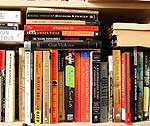Book review: The Smell of Summer Grass by Adam Nicolson
Leslie Geddes-Brown reviews the memoir from Adam Nicholson of his time at Perch Hill in Sussex


Exquisite houses, the beauty of Nature, and how to get the most from your life, straight to your inbox.
You are now subscribed
Your newsletter sign-up was successful
Memoir
The Smell of Summer Grass: Pursuing Happiness. Perch Hill 1994-2011
Adam Nicolson (HarperPress, £20)
Everyone agrees that Adam Nicolson writes beautifully and never-quite-falls into a mood where violins play softly in the background. I like him best when he uses words as invective-far more biting than, say, the pure poetry of his descriptions of the Shiant Isles he wrote about in his acclaimed book Sea Room.
Move him from the Hebrides to Perch Hill in Sussex, which he and his wife, Sarah Raven, bought with 90 acres in 1994, and you get a real blast of feeling about ‘the killer know-alls'. ‘No area of life was immune. I remember, classically, having our stack of firewood analysed by a man, who, from what he was saying, was obviously chief firewood analyst for Deutsche Morgan Grenfell.' Critics' advice took in cloacal swabs for chickens, sugar-free baked beans and the necessity of castrating dogs.
To be fair to the nay-sayers, it's hard to see what persuaded the couple to buy this farm other than the intuition that it was their refuge. The land was the worst in the area, they had to buy at full price and the buildings left polite guests quite speechless: they simply couldn't think of anything complimentary to say. The pine, louvred cupboards and gilded downlighters symbolise for Mr Nicolson everything he hated about the house.
He was desperate to improve the fields, ‘the rice and curry of landscape aesthetics'. His wife wanted a garden so much she bought a Volvo lorry full of instant gardening. They bought miserable, hated hens-‘some-thing about them invites mal-treatment'-and sheep, together with Roger the ram, who, Mr Nicolson says, reminded him of his spotty teenage self trotting two yards behind pristine girls. ‘At least I didn't have to wear the sort of thing we put on Roger, a harness... holding a large yellow block of crayon wax in the middle of his chest.' This was to show when Roger had scored.
Exquisite houses, the beauty of Nature, and how to get the most from your life, straight to your inbox.
It's hard, reading the agonies the pair go through-Sarah birthing with the ewes (although in a special bath), the neighbour who Tarmaced their rural lane, the constant shortage of money and increasing need to spend it to foresee the outcome: Sarah's glossy, successful gardening and writing business and the author's revelation that ‘the only crop this landscape can viably produce is beauty and the only thing it can sell is itself.
It is doing that very well'. It's ironic that he objects to the City man who believes that poverty stricken farmers should sell their assets (at vast profit) to merchant bankers longing for rural calm and beauty. The Nicolsons bought their rundown farm to escape from London, the catalyst being a brutal mugging when bleach was poured into the author's eyes. Objecting to the assault's impersonal nature and that of London generally, he wanted to leave the anonymity of the city to be rooted in the country ‘like a human carrot'. In this moving book, the unexpected always happens. But then, as Lord Nelson said: ‘The boldest measures are the safest.' And so it turned out.
Country Life is unlike any other magazine: the only glossy weekly on the newsstand and the only magazine that has been guest-edited by His Majesty The King not once, but twice. It is a celebration of modern rural life and all its diverse joys and pleasures — that was first published in Queen Victoria's Diamond Jubilee year. Our eclectic mixture of witty and informative content — from the most up-to-date property news and commentary and a coveted glimpse inside some of the UK's best houses and gardens, to gardening, the arts and interior design, written by experts in their field — still cannot be found in print or online, anywhere else.
